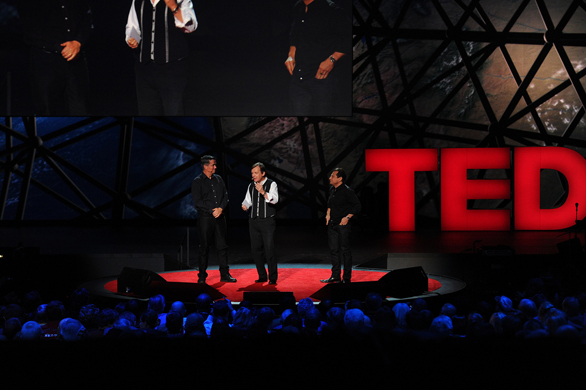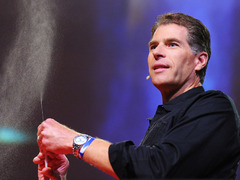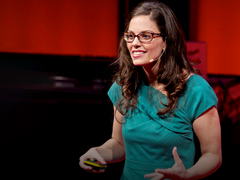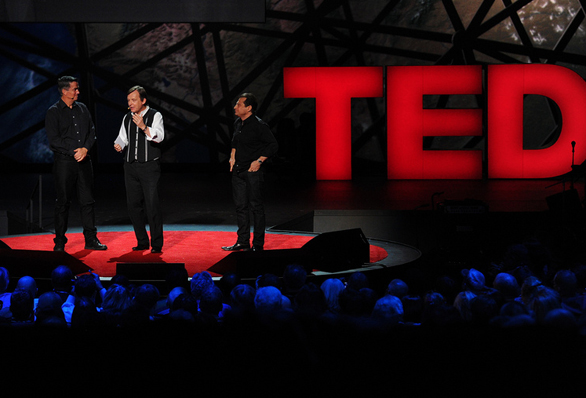 TED2013 kicks off in just 11 days. And, in the very first session, Robert J. Gordon and Erik Brynjolfsson will ascend the stage for a debate on the future of work. While Gordon will focus on how our current ecosystem of innovation is too focused on personal gadgetry, and thus isn’t setting us up to solve the big problems of the future, Brynjolfsson will express the view that the digital revolution is propelling us forward rapidly, giving us a good foundation for future prosperity. It’s shaping up to be a fascinating discussion — one that may well change your mind.
TED2013 kicks off in just 11 days. And, in the very first session, Robert J. Gordon and Erik Brynjolfsson will ascend the stage for a debate on the future of work. While Gordon will focus on how our current ecosystem of innovation is too focused on personal gadgetry, and thus isn’t setting us up to solve the big problems of the future, Brynjolfsson will express the view that the digital revolution is propelling us forward rapidly, giving us a good foundation for future prosperity. It’s shaping up to be a fascinating discussion — one that may well change your mind.
This will hardly be the first time that two TED speakers have verbally jousted oon the TED stage. Here, sets of TED speakers who have disagreed — either in an official debate or in separate talks — to give you a taste of what to expect at TED2013, where the TED Blog will be reporting live every second.
Paul Zak vs. Molly Crockett: Is oxytocin the moral molecule?
In these two talks given a year apart, neuroscience experts Paul Zak and Molly Crockett disagree on what we can say about oxytocin.
 Paul Zak: Trust, morality -- and oxytocin?
Paul Zak: Trust, morality — and oxytocin?
Paul Zak: Trust, morality -- and oxytocin?
Paul Zak: Trust, morality — and oxytocin?Morality is a distinctively human trait and it might be because of the hormone oxytocin. In this talk from TEDGlobal 2011, neuroeconomist Paul shares his 10-year search for what he calls “the moral molecule” and reveals his studies on how oxytocin boosts trustworthiness, empathy and even the desire to give money to charity. |
 Molly Crockett: Beware neuro-bunk
Molly Crockett: Beware neuro-bunk
Molly Crockett: Beware neuro-bunk
Molly Crockett: Beware neuro-bunkNeuroscientist Molly Crockett wants everyone to spot “neuro-fiction” — claims that overshoot our current understanding of the brain. Crockett evokes Zak’s work with oxytocin. According to Crockett, studies on oxytocin “are scientifically valid and they have been replicated, but they’re not the full story.” She explains, “Other studies have shown that boosting oxytocin increases envy, it increases gloating. Oxytocin can bias people to favor their own group.” |
Peter Diamandis vs. Paul Gilding: What will the future look like?
 Because these two speakers expressed such different views at TED2012, TED Curator Chris Anderson invited the pair onstage for a formal debate.
Because these two speakers expressed such different views at TED2012, TED Curator Chris Anderson invited the pair onstage for a formal debate.
| Peter Diamandis: Abundance is our future At TED2012, activist Peter Diamandis explains that — yes — news reports may sound doomsday, but that we are actually living in the most peaceful and abundant time of human existence. He imagines a future where humans continue to invent and innovate to solve the challenges that face us. |
| Paul Gilding: The Earth is full Also speaking at TED2012, writer Paul Gilding spoke from a very different viewpoint — saying that humans have not only filled the world with our bodies, waste and things, but that we used up all our resources. He worries that, if we stay on the same path, it could be the end of this civilization. |
Rick Warren vs. Dan Dennett: Do our lives have purpose?
Dan Dennett couldn’t help but respond directly to Rick Warren at TED2006, after hearing his talk.
 Rick Warren: A life of purpose
Rick Warren: A life of purpose
Rick Warren: A life of purpose At TED2006, pastor Rick Warren said, “I believe spiritual emptiness is a universal disease.” He explained his belief in God, and how he thinks each one of us is here for a specific purpose that matters, and describes his crisis of purpose in the wake of releasing a best-selling book. |
 Dan Dennett: Let's teach religion -- all religion -- in schools
Dan Dennett: Let's teach religion -- all religion -- in schools
Dan Dennett: Responding to Pastor Rick Warren Speaking at the same conference, philosopher Dan Dennett suggests that religions are natural phenomenon, evolving over time to survive. Dennett says that life — both ours and that of animals — has been designed by evolution, and lacks an individual purpose. |
Stewart Brand vs. Mark Z. Jacobson: Nuclear energy?
>
[ted id=881]
Before you watch this debate from TED2010, try this experiment: Ask yourself, who do you agree with now? Watch the debate. And then — ask yourself again.
| Stewart Brand: Nuclear energy is our best bet During an onstage debate held at TED2010, futurist Stewart Brand explained why he is in favor of nuclear energy — because it is far more feasible on a large scale than either wind or solar power. “If all of your electricity in your lifetime came from nuclear [energy], the waste from that lifetime of electricity would go in a Coke can,” he says. |
| Mark Z. Jacobsen: Nuclear energy is short-sighted Meanwhile, environmental engineer Mark Z. Jacobsen countered that nuclear power has extreme downsides, producing far more carbon dioxide and air pollution than other alternative energies. To boot, nuclear power plants takes far longer to build, meaning we’ll have to stick with coal power for the foreseeable future. Not to mention that nuclear power could enhance nuclear weapon proliferation. |
Note: This post was originally published on August 6, 2012, and was updated with a new introduction and set of examples on Feb. 13, 2013.
Comments (5)
Pingback: 201. John Oliver On The Dangers Of Not Challenging Junk Science – How to Shape Human Behavior
Pingback: TED: In TED, can we find that two speakers offered opposite views? - Quora
Pingback: Wizmo Blog » Blog Archive » Disagreements on the TED stage: Speaker debates over the years
Pingback: Quote From Stewart Brand | Consilient Interest